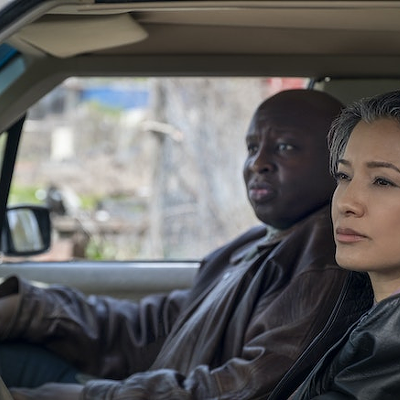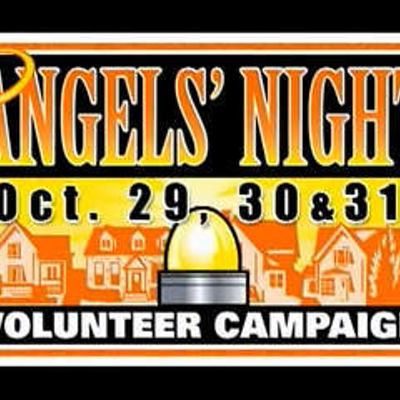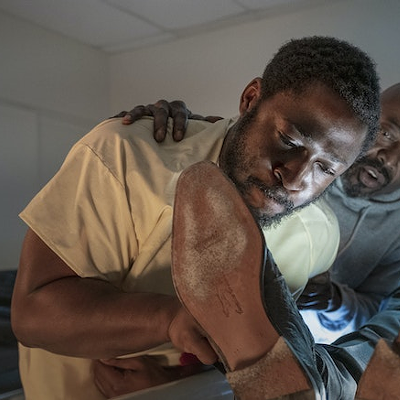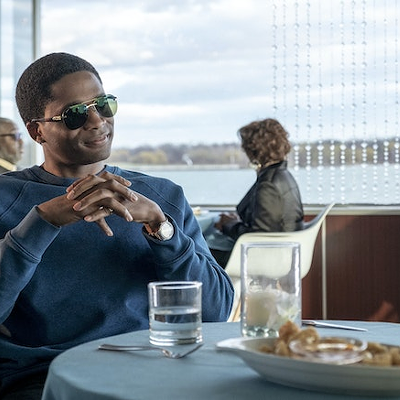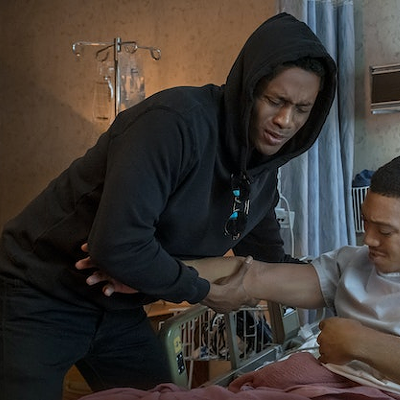NBC’s ‘Grosse Pointe Garden Society’ brings drama to Detroit’s affluent suburbs
This new prime-time soap takes on class divides in Detroit’s affluent suburbs, with a dose of intrigue and dark humor
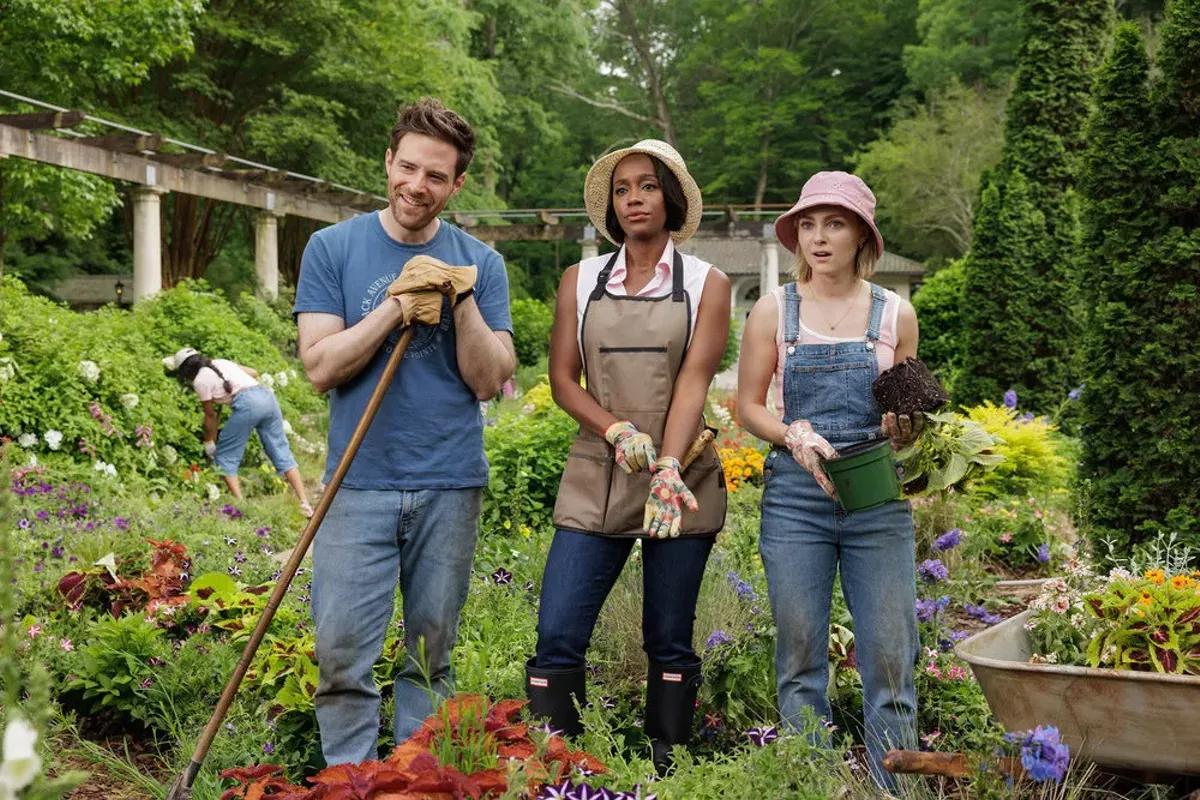

Audio By Carbonatix
[
{
"name": "GPT - Leaderboard - Inline - Content",
"component": "35519556",
"insertPoint": "5th",
"startingPoint": "3",
"requiredCountToDisplay": "3",
"maxInsertions": 100,
"adList": [
{
"adPreset": "LeaderboardInline"
}
]
}
]
The first clear image you’ll see in the pilot for Grosse Pointe Garden Society, the glossy, trashy prime-time murder mystery premiering at 10 p.m. Sunday on NBC (Channel 4 in Detroit), is a giant rectangular sign proclaiming “Mack Avenue Garden Center.”
Mack Avenue? On network TV? America, welcome to our little corner of the world.
Grosse Pointe Garden Society, which exploits and expands practically every stereotype most of us assume about our affluent neighbors to the east, was planted and nurtured by the Hollywood creative team of Bill Krebs and Jenna Bans, best known previously for such series as The Family and Good Girls.The duo serve as executive producers, series creators, showrunners, and have been immersed in writing every one of the show’s 13 first-season episodes. (Guess the union prevented them from operating the cameras, too.)
Given the name of Bans’s production entity, Minnesota Logging Company, it’s a fair assumption she hails from the Land of 10,000 Lakes. (Ramsey, Minnesota, to be exact.) For Krebs, however, Garden Society — not to be confused with the Grosse Pointe Garden Center in the War Memorial — is a kind of bizarre homage to his hometown.
Krebs was born at Cottage Hospital (now Henry Ford Medical Center — Grosse Pointe Cottage), raised in Grosse Pointe Park, and attended Maire Elementary School before splitting time in Birmingham after his parents’ divorce. But can he ever go home again after this series hits the air?
“I’ve got to admit, I’ve worried about that a little bit,” Krebs says with a laugh during a recent phone conversation, accompanied by Bans. “Will I be a pariah?”
Pointe taken. One network description of the series reads, “In a wealthy suburb where everything appears to be perfect on the surface, four members of the local garden club get entangled in a scandalous murder.” Holy Shores! Sound like any suburb you know?
At the center of the Garden plot is Alice (AnnaSophia Robb, The Carrie Diaries), who doubles as series narrator, a young high school teacher and aspiring writer trapped in a classroom filled with snotty, entitled students. She likens herself to a geranium, in that “the worst thing you can do to a geranium is to plant one where it doesn’t belong.”
To maintain her wellness (and sanity), Alice volunteers at the local Grosse Pointe Garden Society alongside Catherine (Aja Naomi King, Lessons in Chemistry), a successful real estate agent trapped in a loveless marriage; Brett (Ben Rappaport, Mr. Robot), a divorced father of two struggling to compete with his ex-wife’s well heeled husband; and Birdie (Melissa Fumero, Brooklyn Nine-Nine), a lavish, pretentious wild child whose liquid diet consists of martinis and who’s only at the garden club to serve out her sentence of community service. Perhaps the show’s most recognizable face is Nancy Travis as Alice’s grandchild-obsessed mother, her Michigan connection being Tim Allen’s wife on Last Man Standing for nine seasons.
(Side note: how refreshing to see the character of Catherine, a lovely, successful African American woman, depicted as a resident of the Pointes. She must have managed to evade the barricades.)
Oooh, so many questions: Jenna, how did you react when Bill approached you about setting a prime-time soap in Grosse Pointe? “I love the Michigan setting because it has that Midwest familiarity for me,” Bans says. “We actually had Good Girls set in Detroit, but we never really said what city it was. I consider myself an honorary Michigander.”
Was NBC equally as accepting when you pitched a Grosse national product? “You know, I think they loved it,” Bans recalls. “We didn’t have a lot of pushback. We packaged it as, yes, we’re dealing with class struggles, the aspirational aspects of a wealthy community, but it’s all wrapped into this sort of thriller, twisty-turny, darkly comic murder mystery, and I think they appreciated how all those things will be balanced.”
Adds Krebs, a U-M alum, “The way we designed it, Alice and Brett are the working class, Catherine and Birdie are the upper class. So we really wanted to show the dynamic and tension between these two sets of variables, how each could relate to the other in certain circumstances. That what looks so beautiful and perfect on the surface can be fraught with problems and chaos and destruction and damage. That everyone has their problems, no matter where they are in life.”
Bans adds that NBC’s only request was “keep it sexy.” Mission accomplished: extramarital affairs seem to erupt every few minutes. Tragically, however, although some scenes look like they were shot in the shopping districts on Kercheval, Garden Society is filmed not here but in Atlanta due to a partnership between Universal Television and a studio there. “There’s a place called Druid Hills outside of Atlanta that looks very much like Grosse Pointe,” Krebs observes. “It’s all old Pewter [homes], manicured lawns, very old money. We would have loved to shoot in Grosse Pointe, if not for the film incentives in Atlanta.”
(Screw you, Snyder.)
The first TV series with the cities’ name in the title since the short-lived WB sitcom Grosse Pointe a quarter century ago, this Grosse Pointe yearns to become the 21st century’s Dallas. Instead of “Who Shot J.R.?” however, Garden Society’s biggest mystery is “Who got shot?” All we see is a corpse tightly wrapped and inconveniently buried underneath the flora and fauna of the garden club. Potential victims are many: Krebs and Bans promise we’ll find out who the dearly departed was before season’s end.
Local viewers will find several subtle tributes to Michigan and metro Detroit seeded throughout the scripts. In one scene Brett orders “a round of Coneys” for the table at a Grosse Pointe diner. (Possibly because Lafayette was closed.) When Catherine complains that the club vice president wants twice as many tulips planted “because we’re Dutch all of a sudden and living in Holland,” your first thought may be a city, not a nation. But what led to the idea of setting the series at a garden club in the first place?
Bans says they wanted to explore a location that hadn’t been used very often in prime time, but Krebs digs deeper. “In Grosse Pointe I remember they used to have these garden tours where they would go through people’s backyards and everyone from the community would come,” he says. “It didn’t matter where you were from in the Pointes, everyone was part of the same world. We thought it was a great intersection, all these different classes and personalities.”
Krebs hastens to add, however, that Garden Society is not based solely on those tours of his memory. “We researched a lot of garden clubs from across the United States,” he declares. In fact, Grosse Pointe Garden Society has to be the only TV series in history that maintains a full-time, dedicated garden consultant on set.
“First of all, we have to make sure the garden stays alive,” says Bans. “But just like on a medical show you’d have a medical consultant to make sure you’re staying true to science, we have a garden consultant to make sure we’re staying true to horticulture, which always makes us laugh.”
Krebs adds, “He’s always telling us we picked the wrong flower, or this plant couldn’t exist in this season, or this one would die. He loves to send us emails.”

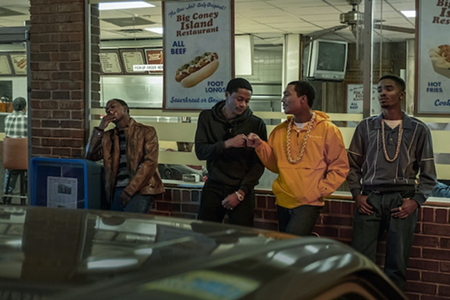
![Episode 1: The Raven Lounge In episode one, K-9 invites Meech to a business dinner at the historic Raven Lounge, which opened in 1966 by Sam Watts and prides itself on being Detroit’s oldest blue’s bar. The club was created “to give up-and-coming Motown [talent] a place to play,” owner Tommy Stephens told National Geographic “It’s where stars came to listen to the blues.” Those stars included B.B. King, Diana Ross, Martha Reeves, and Smokey Robinson.](https://media1.metrotimes.com/metrotimes/imager/the-best-detroit-moments-from-bmf-season-2-photos/u/slideshowthumb/32714586/bmf2-201sg-00-19-27-08-a.webp?cb=1738567633)
